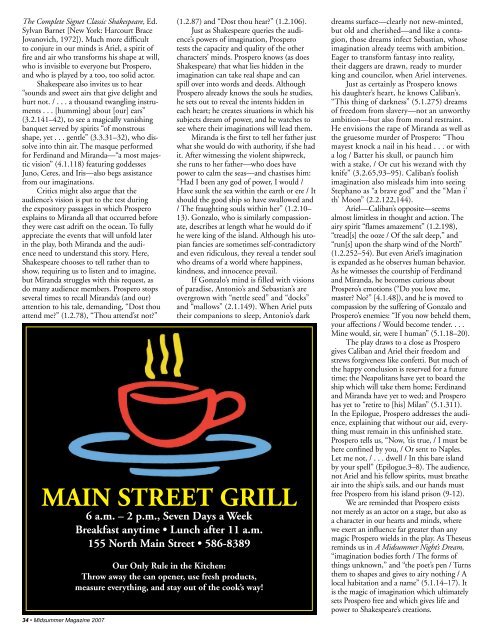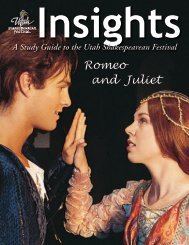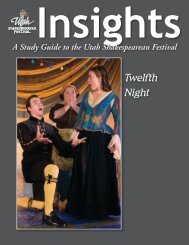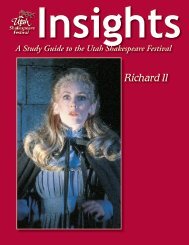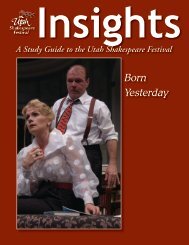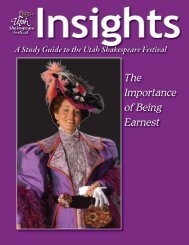Midsummer Magazine 2007 - Utah Shakespearean Festival
Midsummer Magazine 2007 - Utah Shakespearean Festival
Midsummer Magazine 2007 - Utah Shakespearean Festival
Create successful ePaper yourself
Turn your PDF publications into a flip-book with our unique Google optimized e-Paper software.
The Complete Signet Classic Shakespeare, Ed.Sylvan Barnet [New York: Harcourt BraceJovanovich, 1972]). Much more difficultto conjure in our minds is Ariel, a spirit offire and air who transforms his shape at will,who is invisible to everyone but Prospero,and who is played by a too, too solid actor.Shakespeare also invites us to hear“sounds and sweet airs that give delight andhurt not. / . . . a thousand twangling instruments. . . [humming] about [our] ears”(3.2.141–42), to see a magically vanishingbanquet served by spirits “of monstrousshape, yet . . . gentle” (3.3.31–32), who dissolveinto thin air. The masque performedfor Ferdinand and Miranda—“a most majesticvision” (4.1.118) featuring goddessesJuno, Ceres, and Iris—also begs assistancefrom our imaginations.Critics might also argue that theaudience’s vision is put to the test duringthe expository passages in which Prosperoexplains to Miranda all that occurred beforethey were cast adrift on the ocean. To fullyappreciate the events that will unfold laterin the play, both Miranda and the audienceneed to understand this story. Here,Shakespeare chooses to tell rather than toshow, requiring us to listen and to imagine,but Miranda struggles with this request, asdo many audience members. Prospero stopsseveral times to recall Miranda’s (and our)attention to his tale, demanding, “Dost thouattend me?” (1.2.78), “Thou attend’st not?”(1.2.87) and “Dost thou hear?” (1.2.106).Just as Shakespeare queries the audience’spowers of imagination, Prosperotests the capacity and quality of the othercharacters’ minds. Prospero knows (as doesShakespeare) that what lies hidden in theimagination can take real shape and canspill over into words and deeds. AlthoughProspero already knows the souls he studies,he sets out to reveal the intents hidden ineach heart; he creates situations in which hissubjects dream of power, and he watches tosee where their imaginations will lead them.Miranda is the first to tell her father justwhat she would do with authority, if she hadit. After witnessing the violent shipwreck,she runs to her father—who does havepower to calm the seas—and chastises him:“Had I been any god of power, I would /Have sunk the sea within the earth or ere / Itshould the good ship so have swallowed and/ The fraughting souls within her” (1.2.10–13). Gonzalo, who is similarly compassionate,describes at length what he would do ifhe were king of the island. Although his utopianfancies are sometimes self-contradictoryand even ridiculous, they reveal a tender soulwho dreams of a world where happiness,kindness, and innocence prevail.If Gonzalo’s mind is filled with visionsof paradise, Antonio’s and Sebastian’s areovergrown with “nettle seed” and “docks”and “mallows” (2.1.149). When Ariel putstheir companions to sleep, Antonio’s darkMAIN STREET GRILL6 a.m. – 2 p.m., Seven Days a WeekBreakfast anytime • Lunch after 11 a.m.155 North Main Street • 586-838934 • <strong>Midsummer</strong> <strong>Magazine</strong> <strong>2007</strong>Our Only Rule in the Kitchen:Throw away the can opener, use fresh products,measure everything, and stay out of the cook’s way!dreams surface—clearly not new-minted,but old and cherished—and like a contagion,those dreams infect Sebastian, whoseimagination already teems with ambition.Eager to transform fantasy into reality,their daggers are drawn, ready to murderking and councilor, when Ariel intervenes.Just as certainly as Prospero knowshis daughter’s heart, he knows Caliban’s.“This thing of darkness” (5.1.275) dreamsof freedom from slavery—not an unworthyambition—but also from moral restraint.He envisions the rape of Miranda as well asthe gruesome murder of Prospero: “Thoumayest knock a nail in his head . . . or witha log / Batter his skull, or paunch himwith a stake, / Or cut his wezand with thyknife” (3.2.65,93–95). Caliban’s foolishimagination also misleads him into seeingStephano as “a brave god” and the “Man i’th’ Moon” (2.2.122,144).Ariel—Caliban’s opposite—seemsalmost limitless in thought and action. Theairy spirit “flames amazement” (1.2.198),“tread[s] the ooze / Of the salt deep,” and“run[s] upon the sharp wind of the North”(1.2.252–54). But even Ariel’s imaginationis expanded as he observes human behavior.As he witnesses the courtship of Ferdinandand Miranda, he becomes curious aboutProspero’s emotions (“Do you love me,master? No?” [4.1.48]), and he is moved tocompassion by the suffering of Gonzalo andProspero’s enemies: “If you now beheld them,your affections / Would become tender. . . .Mine would, sir, were I human” (5.1.18–20).The play draws to a close as Prosperogives Caliban and Ariel their freedom andstrews forgiveness like confetti. But much ofthe happy conclusion is reserved for a futuretime; the Neapolitans have yet to board theship which will take them home; Ferdinandand Miranda have yet to wed; and Prosperohas yet to “retire to [his] Milan” (5.1.311).In the Epilogue, Prospero addresses the audience,explaining that without our aid, everythingmust remain in this unfinished state.Prospero tells us, “Now, ’tis true, / I must behere confined by you, / Or sent to Naples.Let me not, / . . . dwell / In this bare islandby your spell” (Epilogue.3–8). The audience,not Ariel and his fellow spirits, must breatheair into the ship’s sails, and our hands mustfree Prospero from his island prison (9-12).We are reminded that Prospero existsnot merely as an actor on a stage, but also asa character in our hearts and minds, wherewe exert an influence far greater than anymagic Prospero wields in the play. As Theseusreminds us in A <strong>Midsummer</strong> Night’s Dream,“imagination bodies forth / The forms ofthings unknown,” and “the poet’s pen / Turnsthem to shapes and gives to airy nothing / Alocal habitation and a name” (5.1.14–17). Itis the magic of imagination which ultimatelysets Prospero free and which gives life andpower to Shakespeare’s creations.


